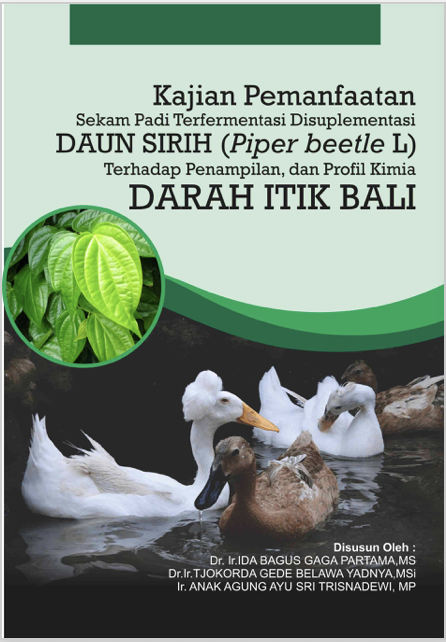
STUDY ON THE UTILIZATION OF RICE HUSK FERMENTED SIRIH LEAF DISUPLEMENTATION (Piper Beetle L) ON APPEARANCE, AND PROFILE OF BLOOD CHEMICALS IN BALI
Dr. Ir.IDA BAGUS GAGA PARTAMA,MS Dr.Ir.TJOKORDA GEDE BELAWA YADNYA,MSi Ir. ANAK AGUNG AYU SRI TRISNADEWI, MP
ISBN : ISBN 978-602-5742-25-5 Published : 2018
Abstrak
STUDY ON THE UTILIZATION OF RICE HUSK FERMENTED SIRIH LEAF DISUPLEMENTATION (Piper Beetle L) ON APPEARANCE, AND PROFILE OF BLOOD CHEMICALS IN BALI
This book is the result of research funded by the University's Flagship Research, Fiscal Year 2017. To increase productivity of livestock products, relatively high feed costs are needed in the range of 60 - 70%. To minimize the cost of rations, alternative ration materials need to be utilized, including rice husks which are quite numerous. However, the crude fiber content of 35% is difficult to digest by livestock, especially in non-ruminant animals or poultry and its digestibility is relatively low, so it needs to be managed with effective Microorganisms-4 (EM-4) fermentation technology. EM-4 solution contains several microbes that can help in the digestion process and will affect a better appearance in livestock. The resulting product is healthier and has no negative effect on consumer health. Supplementation which contains antioxidant substances will positively influence the blood chemistry profile. Therefore, in the fermented rice husk ration and betel leaf (Piper beetle L) which is associated with the appearance and chemical profile of the blood of female Bali ducks.
This book discusses those related to the use of agricultural or plantation wastes, for example sawdust fermented with EM-4 solution and supplemented with bay leaves. Bay leaf acts as an antioxidant and is useful in improving nutrition rather than Bali duck meat. Yadnya et al., (2007) have tried granting sawdust in rations fermented with EM-4 solution supplemented with bay leaves (Zygium polyanthum), apparently can improve the quality of carcass by increasing the percentage of meat and decreasing the percentage of fat including the skin, decreasing fishy odor, tastes better and overall value is better than other treatments. Susila et al., (2015), have tried the provision of Aspergillus niger fermented rice husk supplemented with purple sweet potato leaves on the appearance, antioxidant profile and cholesterol levels in bali duck meat. It turns out that the provision of Aspergillus niger fermented rice husk can improve appearance, can increase the antioxidant capacity of reducing Malondialdehide (MDA) and increasing Superoxide dismutase (SOD). Utilization of purple sweet potato skin as a waste when making purple sweet potato chips, and fermented with Aspergillus niger can improve the appearance, carcass, antioxidant profile and can improve lipid profile, and and can improve uric acid and blood sugar in Bali growth phase (Yadnya et al., 2015). Provision of rasum containing rice husk and noni leaf supplemented with multienzymes can increase egg production and cholesterol levels in Bali duck eggs.
